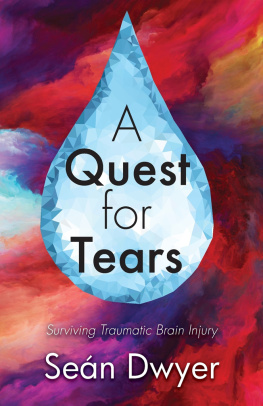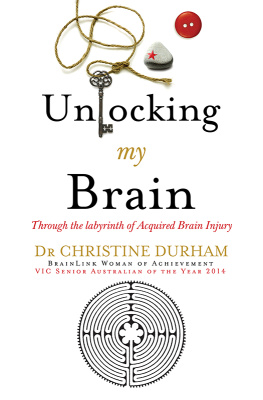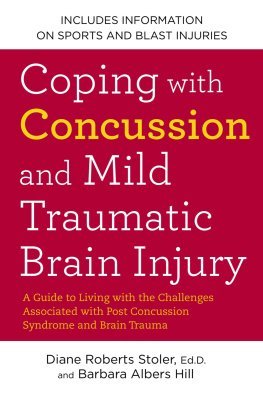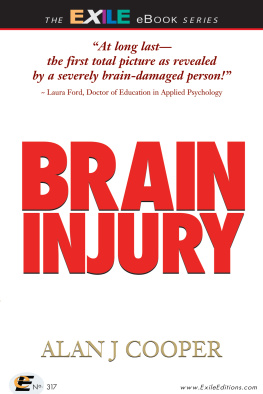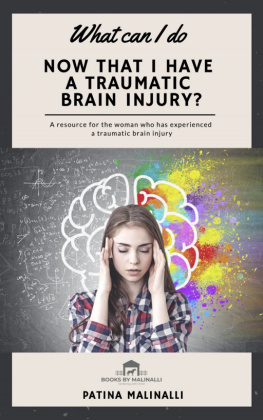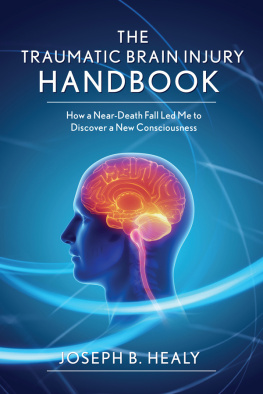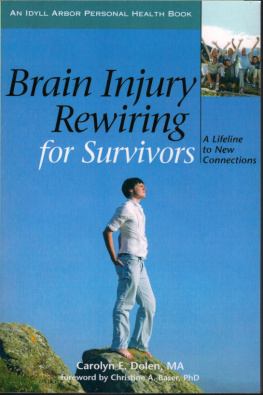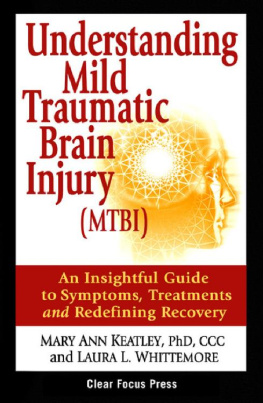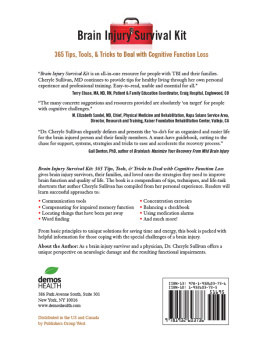

Copyright 2019 Sen Dwyer
All rights reserved. No part of this publication may be reproduced, distributed or transmitted in any form or by any means, including photocopying, recording, or other electronic or mechanical methods, without the prior written permission of the publisher, except in the case of brief quotations embodied in critical reviews and certain other noncommercial uses permitted by copyright law. For permission requests, write to the publisher, addressed Attention: Permissions Co-ordinator, at the address below.
The thoughts, opinions, and experiences described in this book are those of the author, who is not a medical professional. Those seeking medical attention should confer with a licensed medical professional.
Penchant Press International
PO Box 1333
Blaine, WA 98231
USA
Penchantpressinternational.com
ISBN 978-0-97249606-3
ISBN: 978-1-7344945-9-4 (e-book)
LCCN 2018912104
A Quest for Tears: Surviving Traumatic Brain Injury
Sen Dwyer 1st ed.
For my wife, Maureen,
for making this story possible.
For my father, Jack Dwyer,
for supporting every goal I set for myself.
For Patty Shadrix,
who raised me as her own, with unconditional love.
For Robyn Bennett Underwood,
for shaping me into a writer.
For Cami Ostman,
for shaping my words into this text.
The only disability is ones refusal to adapt.
~ Dr. Sean Stephenson
Contents
Introduction
Who am I? Prior to being rear-ended at high speed, I was that guy, a polyglot who was especially a whiz at Spanish, a well-respected college educator, a creative writer with two novels and a nonfiction book under his belt, someone at ease with the written word as both a reader and a writer, a prolific songwriter, someone blessed with an excellent memory and a wide range of interests and knowledge, an avid networker and supporter of my talented writer colleagues, and a person compassionate enough to cry at the misfortunes of others.
Now, Im that guy, the one who listens to audiobooks because reading makes him dizzy and nauseated and brings on sudden deep fatigue, the one who goes to bed at 7pm and sleeps 10 hours and then naps for two hours in the afternoon, the one who really does wear sunglasses at night and on cloudy days, the one who would have remembered your name two years ago but cant quite keep hold of it now, the one who cant write fiction because he cant slip into the milieu where his characters live, the one who studies research on recovery from Traumatic Brain Injury to the exclusion of almost all previous intellectual pursuits. The one who hasnt shed a single tear for any reason, tragic or joyful, for more than three years.
I am writing nearly four years after a car accident that gave me a concussion and ligament damage in my neck. I missed six months of work as a university professor, and I would have done well to stay home another year, if I could have. Returning to work, though, gave me concrete ways to measure my deficits and my progress in recovering my faculties. The stimuli I have faced are slowly turning my deficits into surpluses. And no one sees much indication of my struggle except for my continuous use of the darkest sunglasses I can find.
Traumatic Brain Injuries (TBI) are a medical mystery. You cant see them, so for many people, they dont exist. Medical professionals can predict their course and duration about as well as seismologists can predict earthquakes. Diligent researchers have found ways to mitigate the short-term damage they cause, but TBIs foster long-term damage as well, and that damage is unpredictable, ranging from none to early-onset dementia. A TBI is, for many people, a time bomb that ticks for decades.
The invisibility of a TBI (without expensive imaging) underscores the need for everyone involved in a head-bumping mishap and its aftermath to be hyper-aware of the possible complications of Post-Concussion Syndrome. Once the patient gets over the need to sleep in a dark room for a couple of days, headaches, light sensitivity, confusion, and other seemingly minor annoyances may continue. Everyone gets headaches and forgets words, so these reactions to a concussion are likely to be dismissed as a minor glitch or annoyance.
You may find yourself on one side or the other of that perceptual barrier; you may be the person who hears you dont look injured, or the person who forgets that your friend or loved one isnt quite the same and needs your help, or a teacher who doesnt even know that the sleepy, distracted kid in your class fell on the playground last week and never told anyone she hit her head.
And yet, for the TBI Survivor who loses enough of an intellectual edge to feel the cognitive deficit, every day is a struggle to keep pace with the treadmill of life, to find workarounds allowing for an appearance of normality, and to avoid collapse under the weight of the battle. Some of us sleep too much, and others suffer terrible insomnia, but we all feel the same fatigue. Some of us find effective ways to mask the headaches, and some of us dont. Some of us find our work affected by various cognitive issues, and others may work in jobs that allow them to fake it until they make it.
The likely readers of this book are Traumatic Brain Injury Survivors, their caregivers and friends, educators who work with young people, and medical professionals who seek the perspective of a Survivor. My goal is to share my physical and emotional experiences, challenges I have faced since I reemerged in society, my own classroom experiences with TBI Survivors, and a discussion of resources with good recovery tips and promising research.
One new facet of life that I already experience is a strong desire to advocate for youthe TBI Survivor, caregiver, family member, teacher, or doctorwho comes into the TBI world. I have already blown a lot of frustration out of my soul through talks with my wife, Maureen, Facebook posts, and monthly meetings of the Brain Injury Alliance of Washington. I am not writing this book to vent. I am writing it to create another road map (some exist already), another perspective, another tool for you to use in your recovery.
I hope you find the narrative useful and interesting, and that you glean a number of insights into your struggle, or that of someone you love, because my journey will apply to a surprising degree to the experience of many people who are recovering. Our brains are wondrous entities, capable of great plasticity and cleverness in the rebuilding process. Because we are all built more or less the same, our brains will tend to adopt the same techniques for repair. That makes my journey valuable to you, and yours to me.
Therefore, I want you to see me as a resource for your personal journey. Any questions you cant get answered from my book or other sources are welcome via my website. Ill use them to build a FAQ for the benefit of other Survivors and their allies. As a community, we can provide information and comfort to each other in this difficult time.
Thanks for joining me on my TBI journey. May your burden be lighter as we walk the path together.
Part 1: Accident and Aftermath.
Impact.
January 29, 2015 3:42pm
Im driving from Fairhaven, on the south side of Bellingham, Washington, toward downtown. My route takes me up a two-lane road that hugs a condo-topped bluff on my right and overlooks a steep drop to Bellingham Bay on the left. To my right, ground cover, green even in January, holds the earth in place. To my left, the expanse of the Bay, dotted with a variety of watercraft, sparkles in the waning sunlight. Northbound, I have the sun at my back, low in the sky, not bothersome in my rearview mirror.

